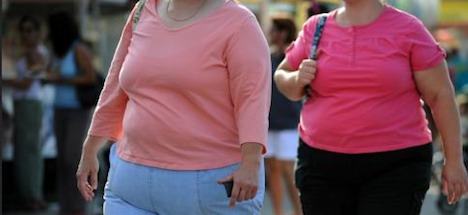Once considered only a problem in high-income countries like the United States, where nearly 70 percent of the adult population is overweight, obesity is now growing fastest in developing nations in Africa and Latin America, according to the World Health Organization (WHO).
As the urgency to tackle the crisis grows, member countries of the UN body late on Monday adopted a 2013-2020 action plan to fight against diseases like cardiovascular illness, cancer, and chronic diabetes.
"The cost of inaction far outweighs the cost of taking action," the body said.
The plan, which targets risky lifestyle choices such as smoking, alcohol consumption and an unhealthy diet, includes a goal to halt the rise in global obesity levels by 2020.
"The fight against obesity is . . . one of the most important factors in fighting noncommunicable diseases," Francesco Branca, WHO's head of nutrition for health and development, told reporters in Geneva.
Obesity levels nearly doubled between 1980 and 2008, when at least one in three adults worldwide was overweight and around one in 10 was considered obese, according to the WHO.
At least 2.8 million adults die each year as a result of being overweight or obese, not counting the large percentages of diabetes, heart disease and cancer cases attributable to overweight, according to the UN agency's numbers.
The world's fattest country is the tiny South Pacific island nation of Nauru, where 71 percent of the population is considered obese, WHO figures show.
The newly adopted plan "is extremely important in addressing one of the most devastating health crises of our time," said John Stewart of the watchdog Corporate Accountability International, describing obesity as "an epidemic".
Since foods high in fat, sugar and salt are often cheaper than healthier alternatives, the battle against the bulge is increasingly spreading to poorer nations, observers say.
"In many high-income countries the problem is levelling off, but the worst problems we see are in low- and middle-income countries where the rate of obesity . . . is increasing at a very fast pace," Godfrey Xuereb, a WHO expert on the issue, told AFP.
The new WHO plan calls for a range of measures to stymy obesity's upward trend, including urging food and beverage companies to cut levels of salt and sugar in their products, replace saturated and trans-fats with unsaturated fats, and reduce portion sizes.
And in a world where more than 40 million children under the age of five are overweight, it also calls on countries to strictly control the marketing of unhealthy foods and drinks to children.
Taking on marketing aimed at youngsters was "incredibly important," Stewart told AFP.
Food and beverage corporations for too long have been "taking advantage of children's inherent vulnerabilities by marketing them unhealthy food that makes them sick", he said.
The industry itself has welcomed most of the WHO proposals, claiming it had already made strides both in "reformulating" existing products to make them healthier and in voluntarily reining in the advertising of unhealthy foods and drinks to youngsters.
The recommended actions "are ones we support and have been implementing on a voluntary basis since 2004," said Jane Reid of the International Food an Beverage Alliance, which represents the world's largest food and drink corporations, including Coca-Cola, McDonald's and Nestlé.
The organization, which maintains that voluntary action and self-regulation by companies is the answer to the obesity problem, was less supportive of the WHO plan's call for countries to consider taxing unhealthy foods and subsidizing healthier choices in a bid to impact eating habits.
"Fiscal measures aimed specifically to change behaviour are complex to design and enforce," Reid wrote in an email to AFP, adding there was little proof such taxes would help improve eating habits.
And, she maintained, a food tax "would be felt hardest by low-income families," who might "compensate for unanticipated budget shortfalls by buying more energy-dense, lower-nutrient foods."
Stewart meanwhile cautioned against giving the industry players widely blamed for the obesity epidemic too much say in how to solve the problem.
"What we really need are statutory regulations that are binding and make a real impact on kids' health," he said.



 Please whitelist us to continue reading.
Please whitelist us to continue reading.
Member comments